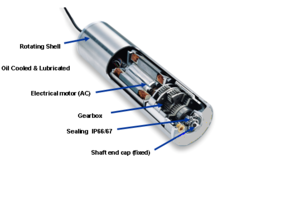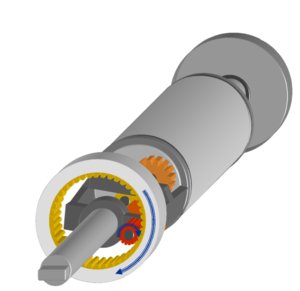Difference between revisions of "Drum Motors"
| Line 1: | Line 1: | ||
[[Category:Actuators, Drives]]{{Knoppen}} | [[Category:Actuators, Drives]]{{Knoppen}} | ||
[[File:Drum motor.png|thumb|right|Drum motor with planetary gear]] | [[File:Drum motor.png|thumb|right|Drum motor with planetary gear]] | ||
[[File:Drum motor2.png|thumb|right|Drum motor]] | [[File:Drum motor2.png|thumb|right|Drum motor]] | ||
'''Drum Motor''' or motorised pulley is a geared motor drive enclosed within a steel shell providing a single component driving pulley for [[Conveyor Belts]]. | '''Drum Motor''' or motorised pulley is a geared motor drive enclosed within a steel shell providing a single component driving pulley for [[Conveyor Belts]]. | ||
The drum motor concept was first recorded in 1928 but was not realised until the early 1950s when it was first produced specifically for conveyor belt applications. The idea was to produce a compact, totally enclosed single component drive unit with high efficiency and lower frictional losses than a conventional [[Gear Motors]]. The new design was quick and easy to install, required no maintenance and because of its totally enclosed hermetically IP66 sealed design would be unaffected by dust, dirt grease or water. Today you see many examples of drum motor applications in Airport check in [[Conveyors]] and security machines, supermarket check stands, food processing conveyors and weighing equipment. | The drum motor concept was first recorded in 1928 but was not realised until the early 1950s when it was first produced specifically for conveyor belt applications. The idea was to produce a compact, totally enclosed single component drive unit with high efficiency and lower frictional losses than a conventional [[Gear Motors]]. The new design was quick and easy to install, required no maintenance and because of its totally enclosed hermetically IP66 sealed design would be unaffected by dust, dirt grease or water. Today you see many examples of drum motor applications in Airport check in [[Conveyors]] and security machines, supermarket check stands, food processing conveyors and weighing equipment. | ||
==Design== | ==Design== | ||
The drum motor comprises an asynchronous or synchronous electric motor, or hydraulic motor fixed to a stationary shaft at one end of the drum and directly coupled through the motor’s rotor pinion to an in-line helical or planetary [[Gearboxes]] which are fixed to the other stationary shaft. The torque is transferred from the motor via the gearbox to the drum shell through a coupling or geared rim attached to the shell or end housing . | |||
==Environment and Application== | ==Environment and Application== | ||
Drum motors can be designed to work in temperatures from minus 40 deg. C to plus 50 deg. C and possibly more. They can withstand high pressure water jets, chemical cleaning and extreme dusty conditions. They can be installed horizontally or vertically and used in non-conveyor belt applications. Most drum motors have zero or minimal maintenance which means higher productivity and less downtime. | |||
==Components== | ==Components== | ||
The drum motor needs fewer parts and has low inventory costs as it just consists of the drum motor and two fixing brackets. Unlike conventional [[Drives]] that require up to 8 or more separate components, most of which have to be purchased from different suppliers or manufactures specially.Further advantage is its dimension. The drum motor is often lighter than conventional drives and the weight is evenly distributed within the conveyor frame.The motor, gear box and bearings are totally enclosed and sealed in a shell, therefore they are unlikely to fail due to harmful environmental conditions such as water, dust, dirt, grit, chemicals, grease, oil, and so on. | The drum motor needs fewer parts and has low inventory costs as it just consists of the drum motor and two fixing brackets. Unlike conventional [[Drives]] that require up to 8 or more separate components, most of which have to be purchased from different suppliers or manufactures specially.Further advantage is its dimension. The drum motor is often lighter than conventional drives and the weight is evenly distributed within the conveyor frame.The motor, gear box and bearings are totally enclosed and sealed in a shell, therefore they are unlikely to fail due to harmful environmental conditions such as water, dust, dirt, grit, chemicals, grease, oil, and so on. | ||
Latest revision as of 01:08, 14 March 2013
Drum Motor or motorised pulley is a geared motor drive enclosed within a steel shell providing a single component driving pulley for Conveyor Belts.
The drum motor concept was first recorded in 1928 but was not realised until the early 1950s when it was first produced specifically for conveyor belt applications. The idea was to produce a compact, totally enclosed single component drive unit with high efficiency and lower frictional losses than a conventional Gear Motors. The new design was quick and easy to install, required no maintenance and because of its totally enclosed hermetically IP66 sealed design would be unaffected by dust, dirt grease or water. Today you see many examples of drum motor applications in Airport check in Conveyors and security machines, supermarket check stands, food processing conveyors and weighing equipment.
Design
The drum motor comprises an asynchronous or synchronous electric motor, or hydraulic motor fixed to a stationary shaft at one end of the drum and directly coupled through the motor’s rotor pinion to an in-line helical or planetary Gearboxes which are fixed to the other stationary shaft. The torque is transferred from the motor via the gearbox to the drum shell through a coupling or geared rim attached to the shell or end housing .
Environment and Application
Drum motors can be designed to work in temperatures from minus 40 deg. C to plus 50 deg. C and possibly more. They can withstand high pressure water jets, chemical cleaning and extreme dusty conditions. They can be installed horizontally or vertically and used in non-conveyor belt applications. Most drum motors have zero or minimal maintenance which means higher productivity and less downtime.
Components
The drum motor needs fewer parts and has low inventory costs as it just consists of the drum motor and two fixing brackets. Unlike conventional Drives that require up to 8 or more separate components, most of which have to be purchased from different suppliers or manufactures specially.Further advantage is its dimension. The drum motor is often lighter than conventional drives and the weight is evenly distributed within the conveyor frame.The motor, gear box and bearings are totally enclosed and sealed in a shell, therefore they are unlikely to fail due to harmful environmental conditions such as water, dust, dirt, grit, chemicals, grease, oil, and so on.

